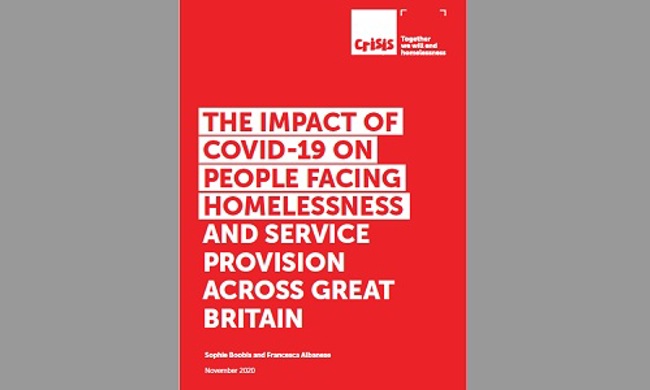The impact of Covid-19 on people facing homelessness across GB (2020)
19.11.2020
The homelessness response to COVID-19 has seen extraordinary action taken across Great Britain to get everyone into safe accommodation during the pandemic. At the same time, the economic impact of coronavirus is exerting sudden pressure on people already pushed to the brink by low wages and high rents. Based on survey responses with voluntary sector organisations and in-depth interviews with local authorities across Great Britain, this research tracks the response of services and the changing support needs of people facing homelessness between March and September 2020.
Key findings:
- Across all three nations, there has been a continued new flow of people experiencing homelessness since the start of the pandemic.
- During the first few months of the pandemic, the increase was driven by those already experiencing homelessness - people who were sofa surfing and living in dangerous and transient accommodation – who became more visible as their living situations forced them to access help.
- Towards the second wave of the pandemic, there have been bigger increases from people who are experiencing homelessness for the first time, people who have been furloughed and those who are newly unemployed.
- Homelessness among people with No Recourse to Public Funds has been a continued issue throughout the whole of the pandemic. The instruction to local authorities to support everyone who was rough sleeping or in accommodation where they could not self-isolate into safe emergency accommodation meant that all local authorities reported an increase in support being provided for people with No Recourse to Public Funds including EEA nationals without entitlements to benefits. In some cases, local authorities reported accommodating quite significant numbers of individuals but with an awareness that the support they were able to offer, beyond emergency accommodation was limited.
- The most significant intervention that governments across all three nations made was the instruction to bring ‘Everyone In’ or provide emergency accommodation for everyone rough sleeping, at risk of rough sleeping, or in accommodation where they could not self-isolate throughout the pandemic. This was an enormous undertaking for local authorities and the challenge of this was reflected on by local authorities. This intervention has clearly saved lives during the pandemic, with infection rates and deaths amongst people experiencing homelessness at extremely low levels compared internationally.
- One of the biggest challenges facing local authorities is the ability to successfully move those housed in emergency COVID-19 accommodation into permanent and secure housing. The structural barriers that existed before the pandemic, including a lack of housing supply and a welfare system that does not address the underlying causes of homelessness have been exacerbated during the pandemic.
- The existing policy frameworks in tackling homelessness in each nation have had an impact on the medium to long term planning for each nation and how effective their homelessness response has been since March.
- There is growing concern over funding to support a homelessness response in both the immediate and longer-term future.
- There was recognition of the positive effect government policies have had on levels of homelessness during the pandemic, particularly the pause in evictions and temporary uplift in local housing allowance. However, there were concerns across all areas about the temporary nature of these changes and the impact these may have on homelessness in the future. Local authorities across each nation were concerned about the newly emerging need for their services as they started to see the impacts of the wider economic context and the cumulation of rent arrears in their local area.
Reference:
Boobis, S. and Albanese, F. (2020) The impact of COVID-19 on people facing homelessness and service provision across Great Britain. London: Crisis

